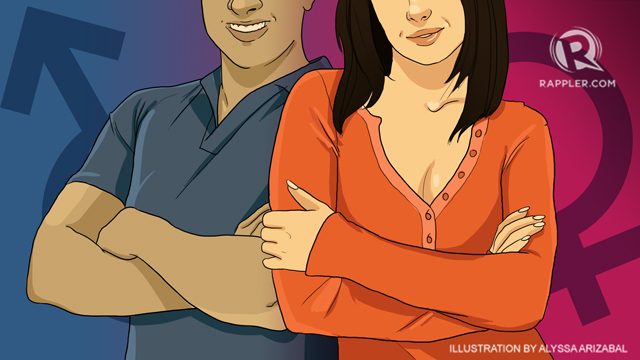SUMMARY
This is AI generated summarization, which may have errors. For context, always refer to the full article.
 In this edition of Clinical Notes, clinical psychologist Margarita Holmes delves deeper into the issues raised by a Two-Pronged reader who is struggling with a difficult relationship and feelings of inadequacy. Now, there’s quite a plot twist – she addresses one of the commenters in the previous article who says he is the man in the Two Pronged story.
In this edition of Clinical Notes, clinical psychologist Margarita Holmes delves deeper into the issues raised by a Two-Pronged reader who is struggling with a difficult relationship and feelings of inadequacy. Now, there’s quite a plot twist – she addresses one of the commenters in the previous article who says he is the man in the Two Pronged story.
This is the second Clinical Notes (CN) inspired by Two Pronged’s July 20 column (“To Stay or To Leave“).
To be more specific, the inspiration came not from the column per se (Sarah’s letter and our answers) but from the comments made by “John” who identified himself as “the drunken abusive gentleman featured in ‘Sarah’s’ post.”
John came up with several noteworthy comments, but the one I want to focus on is his suggestion that we fact check things before answering letters from the people who write us at Two Pronged.
That, of course, is totally out of the question. Here are the reasons:
1. Time, money, energy, and other finite resources. In addition to writing this column once a week, Mr Baer and I have other commitments and, occasionally, even have a life. ☺ No way would we have the time or energy to check whether what the writer said was 100% accurate or not. Neither would we have the money to hire someone to do this.
2. More importantly, fact checking would prevent some people from writing to us, especially if they were worried they would be “outed”;
3. We write this column to share our insights and the-ahem-benefit of our wisdom not only to the specific letter writer but also to the broader Rappler readership, whose own stories will naturally be different in their facts. To a certain extent therefore, context and the general situation are more important than “facts.”
It is possible that Sarah was encouraged to write us because of our June 12 column from another Filipina who was going out with someone British and also had the same problem of being told she just didn’t understand the “more open ways” of the British. Who knows how many letters we may get from other readers who resonate with Sarah’s plight?
4. However, we do not fact check most especially because to do so would be as useless in determining truth as in the following Indian allegory “The Blind Men and the Elephant.”
“A raja’s servant gathered several blind men, to whom he said “Here is an elephant,” To one man he presented the head of the elephant, to another its ears, to another a tusk, to others the trunk, the foot, back, tail, and tuft of the tail, saying to each one that that was the elephant.
When the young men had felt the elephant, they were asked “what sort of thing is an elephant?”
The man who was presented with the head answered, ‘Sire, an elephant is like a pot.’ The man presented with the ear replied, ‘It’s like a winnowing basket.’ The one with a tusk, “a ploughshare,” etc.
“Then they began to quarrel, shouting, ‘Yes it is!’ ‘No, it is not!’ ‘An elephant is not that!’ ‘Yes, it’s like that!’ and so on, till they came to blows over the matter.”
Who is telling the truth, and who is not, in the case of the elephant? And if there can be different facts presented and thus interpreted for something as tangible as an elephant, how much more difficult would it be to ascertain “facts” for something as intangible as the state of a relationship?
How can anyone really tell who is telling the truth here?
More importantly, who is to judge what is true and what is not?
Mr Baer and I are happy being columnists. We have no aspirations to be judges as well (and if we did, I would certainly prefer to go after the people Ombudsman Conchita Carpio Morales is going after, but – sigh – that is another story).
My feeling is (though admittedly, I could be wrong and Sarah purposely lied) is that both Sarah and John told the truth as they saw it.

Scientific journals are replete with studies confirming that men and women perceive thing differently. This ranges from their sense of being threatened, their other feelings and perceptions, their memories of intimate experiences etc. Here are two links that you can easily connect to: here and here.
In other words, despite being in the same space and time and occupying the same world, men and women can have very different viewpoints, just like Sarah and John.
For example, men are wired for risk-taking more than women are, since their brains get a bigger burst of endorphins and sensation of pleasure when faced with a risky or challenging situation. What may seem merely risky and thus exciting to most men, could be threatening to most women.
Speaking specifically about different parts of the brain, women typically have a larger limbic system than men, have their brains activated by the left amygdala (as opposed to men who have theirs activated by the right) and have greater activity in their hippocampus.
Because of the above brain differences women generally are more in touch and expressive with, and thus have an easier time understanding, emotions even if not explicitly verbalized. Their emotions can sometimes influence decisions. Also because of the way both sexes are wired, women tend to experience more internal pain (I imagine, including feelings, expectations, rejection) than men, who tend to experience more external pain.
Finally (as per the brain differences mentioned a few paragraphs before this) because of the greater activity in the female hippocampus, which helps store memories, women are generally better at recalling faces, pictures, objects, and everyday events, which would include interpretations of what was said when and where and what these things mean. Men would tend to deny these memories. Again, who is telling the truth and who not?
Men and women, and thus perhaps John and Sarah, would have different perceptions of the roles and expectations of men and women not only due to their brain differences but also due to their cultural dictates and their life experiences.
Each person owns a portion of the truth and that, we hope, is what they share with us. Sarah and John may each be re-telling facts – and thus, his or her own subjective truths – as each sees it. Who are we to pronounce that one’s story is better than the other?
Besides, what, truly, is the truth? It can be totally different things to different people.
Our column does not encourage – in fact, will not respond to – a “he said, she said” battle where we are asked to judge who tells the most convincing story. Not going to happen.
Mr Baer and I do not see each other as referees, judges or members of the jury when we write Two Pronged. We see ourselves as a couple, one with a PhD in clinical psychology, the other with a Ph.D. from the “University of Life” (and yes, I too am cringing as I write this).
But seriously, Mr Baer is not only intelligent, but also sensitive to written subliminal messages and to the many nuanced changes a heart can undergo. We take our column seriously and put our all into what we write, week in and week out. We do all we can to maintain the column’s integrity and sincerely feel that does not necessarily include fact/truth checking.
We hope we have helped and can continue to help one or two people out there, but if we all did was provide some insight, joy or relief from life’s daily grind, that’s good enough for us. And that, believe it or not, is the bloody truth! ☺ – Rappler.com
Add a comment
How does this make you feel?
There are no comments yet. Add your comment to start the conversation.